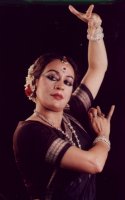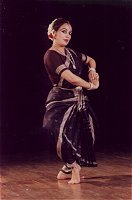
|
 |

|
 |
SONAL MANSINGH by Sam Kumar e-mail: sam_kumar1@yahoo.com Jan 2003  With her graceful movements, sculptural postures, quick silver foot work, emotive expressions, Sonal Mansingh is a delight to behold on the stage. Her mesmerising performances take both the novice as well as the connoisseur to bliss. Her three performances in Chennai were well received. Since 1968 Sonal has been in the forefront of Indian classical scene in India and abroad. Starting to learn Barthanatyam from an young age Sonal mastered this style and became one of the leading dancers in the country. Fascinated by the graceful elegance of Odissi, Sonal began learning it arduously. She went on to become the leading dancer in this uniquely elegant style. Most of the popular Odissi compositions were originally composed for her. No one does the sringar with a fine blend of erotic and aesthetic beauty like Sonal.  Excerpts from a recent conversation. What is the role of dance in society in general? Dance is designed to ennoble people. They entertain while educating the people. In India, dance is considered an integral part of daily life. It nourishes people with spirituality and provides social commentary. If a message is depicted directly it will be boring. But if they are enveloped in beautiful movements, attractive costumes and interesting stories, the message will be well received by the audience. I would say the role of dance has been very crucial in India. There were devadasis, temple dancers, court dancers, dancers for various social occasions, etc. Today's dancer combines all these roles. The dancer's role is merely to point out things. The dancer points out an issue, a problem or explain a metaphor for people to act upon. Since it is an art form, the process is very subtle. Can one modernise classical dance forms? Tradition always changes - sometime minimally, sometimes noticeably. Traditional Indian classical dance has changed. We are not performing dance as it was done a hundred years ago. But the core, which is the collective memory, does not change. The symbolism and metaphor are the same at all times and in all cultures. For example, the characteristics of Krishna and the significance of the flute are universal and timeless. What the dancer interprets becomes modern. For example, in the epics, Krishna dances over the serpent which was poisoning river Yamuna. Krishna conquered it and ordered it to move to the ocean. That is a metaphor. When I dance the number I imagine the pollution in Ganges. So a dancer makes a traditional item modern through her imagination and interpretation. Classical Indian dance forms remain primarily devotional. The devotion depicted in Indian classical dance is not about any particular god. It is devotion to what you believe in. Whatever we do, if we do it with our heart and soul that becomes devotion. It is the spirituality and not the ritual that is important. In every one's life there are phases and with maturity one does becomes spiritual. How do you relate to the audience while you perform? Through my dance I am sharing something with the audience. But there are some people who shut themselves up. They are watching me dance but they are not seeing anything beyond the surface. 'Rasanubava' is the experience of aesthetic delight. For this to happen, the onlooker should be empathetic and open hearted. It is a great bliss for the dancer when she could sense the collective 'rasanubahav' in the audience. It resonates with her spirituality. Of course, the dancer has to reach a certain level of experience before this happens. She must be selflessness and humble. It will not happen if the dancer is arrogant with too much emphasis on her virtuosity, talent or beauty. What is the hallmark of Odissi? Odissi has a sculptural quality. Its undulating grace is unique. This comes from a very strict discipline of torso movement. There are a lot of square postures. Strong postures are juxtaposed with graceful movements. In general, it is very sober compared to other dance forms. It does not want to impress with its grandiose movements. It is very rich and poetic. How are the young Odissi dancers shaping up? A lot of young girls are learning Odissi and a few are performing on stage. But there are only a few serious dancers. In my time, we used to go to the Guru. Now the guru's are running from Chennai to Mumbai, Europe or US to coach their students. The students are not devoting full time to their dance. They are juggling many balls in the air and dance happens to be one of them. In my case I just jumped into dance at the age of fifteen without any expectations of money, fame or trips abroad. I went through a lot of sacrifice and hard work in the process of becoming a dancer. People should realise that to be a dancer is a commitment for a lifetime. How do you feel performing Odissi in Chennai, the fortress of Bharatnatyam? In 1968 I gave my first Odissi performance in Chennai at Museum theater. Doyens such as Rukmani Devi, Subbulaksmi, Sadasivam, guru Dhandayudapani Pillai, guru Ramaiah Pillai were in the front row. In her speech Rukmani confessed that she had thought Odissi was some kind of tribal dance, and that Sonal had proved Odissi is as much a classical form as Bharatnatyam. Since then I have been dancing Odissi in Chennai almost every year. I have a lot of friends and fans here. (smiles) Is classical dance losing its audience? Unfortunately, yes. The main reason is that life has changed over the years. For example in Chennai nowadays you see less women wearing Kancheepuram saris and less men wearing dothis. I don't see kolam in front of many houses. When I was younger there was no TV, no fast-food, no computer and no Internet. People had the time to come and enjoy a dance performance. Now people have more choices. In their drawing room they can switch on the TV and have all types of programs. The computer and Internet are other diversions. If in-spite of these, dance in India is surviving, it is because we offer something imperishable in comparison to the plastic entertainment. What can we do to bring more people to come for the performances ? Journalists like you can and should spread the awareness among people. (Though she started laughing, it was clear that Sonal was genuinely pleading journalists to pitch in for a noble cause) Apart from performances how else can a dancer reach people? There is so much of film dance on television but hardly any classical dance. Since 1978 I have been doing a lot of performances in schools and colleges through out India. I organize lecture demonstrations and workshops for students. In India, classical music has a better reach because people can buy audio tapes and CDs. Unfortunately there are no dance-videos and CDs. I wish that some one invests money and produce quality dance videos and then market them. If it can be done for classical music, why not for classical dance? Indian dancers are handicapped since we don't have impresarios and business managers. All arrangements for performances are done by husband or father who do not have the professional expertise. So the dancers lack basic skills to prepare proper contracts and negotiate with producers. What is your dream project? My wish is to make every one dance. I am not telling this in a superficial manner. Dance is so primary to human being. Every one should learn a little bit of dance in whatever form - folk, social or classical. In Germany, ballet is compulsory for boys and girls up to standard eight. Dance implies a balance of body, understanding of space, power of the body, its grace, music, rhythm. Through dance the mind gets attuned to a rhythm. It is only natural that something so vital should be part of our basic education. Sam Kumar is a Chennai based writer and photographer who loves all forms of classical art. Painting and traveling are his other passions. (January 18, 2003) |